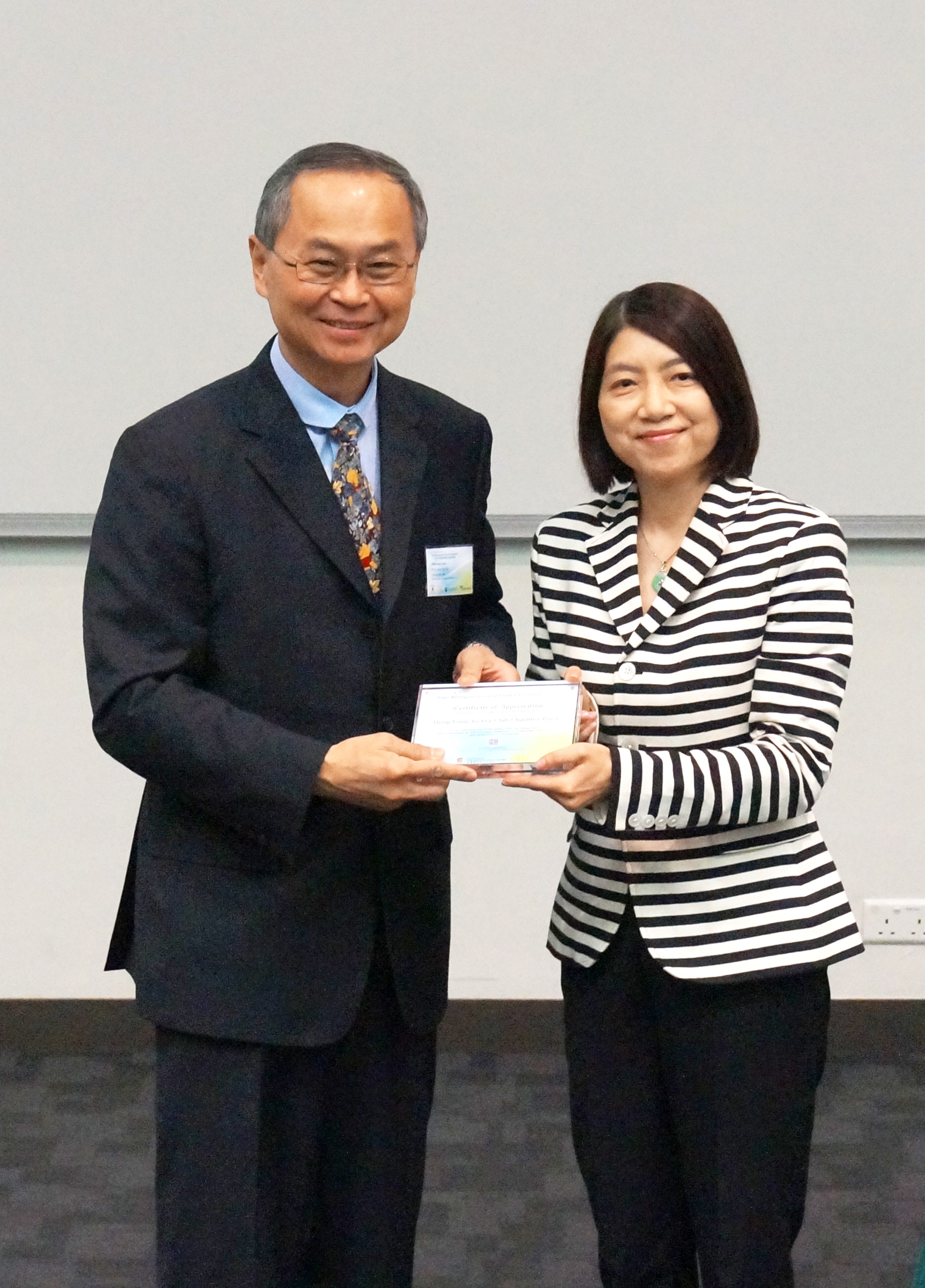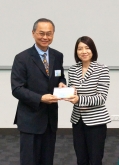CUHK
News Centre
CUHK Hosts Symposium to Explore New Directions for Deaf Education in Hong Kong
The Centre for Sign Linguistics and Deaf Studies (CSLDS) of The Chinese University of Hong Kong (CUHK) hosted The 2014 Symposium on Sign Bilingualism and Deaf Education on 19-21 June 2014 on the University campus. The event was funded by The Hong Kong Jockey Club Charities Trust, and organized by the Faculty of Arts and the Department of Linguistics and Modern Languages of the University. On 19 June 2014, Prof. Fok Tai Fai, Pro-Vice-Chancellor, CUHK and Prof. Lai Pan Chiu, Associate Dean of Arts, officiated at the Opening Ceremony of the 3-day symposium. The guest of honor of the Opening Ceremony was Miss Kitty Liu, Charities Manager, The Hong Kong Jockey Club.
At the opening ceremony, Prof. Fok Tai Fai remarked, ‘One of the crucial criteria for assessing scholarly research these days is not just to identify its potentials for new discoveries, but also to see how these new discoveries may be applied to improve the functional domains of applications for some ultimate benefit of the society. In this regard, this expectation of knowledge transfer has been vividly seen through the development of research into sign linguistics at CUHK, which creates an opportunity for Hong Kong to re-examine the role of sign language in educating deaf people.’
One consequence is to promote the use of a sign bilingual approach in raising and educating deaf children especially in deaf school settings. In recent years, however, the concept of sign bilingualism is also being introduced into mainstream school settings to support deaf students’ classroom learning. All these developments make many parents and educators for the deaf question whether or not acquiring a sign language impedes deaf children’s spoken language development, hence affecting their education.
The symposium is meant to address these issues. Special focus is placed on examining the ingredients for implementing sign bilingualism in mainstream deaf education, hopefully to chart directions for future research. Over 200 participants including local and overseas scholars, researchers, educators and parents from different countries and academic backgrounds took part in this symposium. Local and overseas experts in the field of sign linguistics research and deaf education were invited to deliver insight lectures covering themes like Language Input; Language Development and Language Assessment; Teachers for the Deaf in Sign Bilingual Programming; and Deaf Education in Mainstream Settings.
Thanks to the generous donation of close to $65 million by The Hong Kong Jockey Club Charities Trust back in 2006, CSLDS has been able to set up the ‘Jockey Club Sign Bilingualism and Co-enrollment in Deaf Education (SLCO) Programme’ in a kindergarten and a primary school, in addition to a host of pre-kindergarten programmes like baby signing for deaf infants and sign bilingual literacy training for deaf children. The Programme has also generated a multitude of resources to support deaf and hearing students’ learning, including readers, speech perception training kits, visual and mutli-sensorial learning materials, assessment of sign language as well as online assessments of Chinese literacy.
After eight years of experimentation, CSLDS has gained abundant insights about some optimal conditions for educating deaf children, which is to adopt a sign bilingual and co-enrollment approach. In this approach, the crucial ingredients are (a) educating both deaf and hearing students studying in the same mainstream classroom in both spoken language and sign language, and (b) to place, not one, but a small group of deaf children in a classroom with hearing students co-taught by a hearing teacher and a deaf teacher.
Empirical findings based on regular assessments indicated that the deaf students studying in this linguistically enriched environment have generally advanced their oral language and literacy skills development to a satisfactory level, to the extent that their oral language performance, especially their production skills, progressed without being impeded by their acquiring a sign language. The components for developing their literacy skills, especially written Chinese vocabulary and grammatical knowledge, were progressing in a parallel fashion to the hearing norms, and displayed no obvious differences at some levels of comparison. A recent survey also revealed that these deaf students have potentials to outperform those deaf students who study on their own without deaf peers and deaf teachers in a mainstream setting. More rewarding still is the fact that, being co-enrolled and educated in a sign bilingual environment, the deaf and hearing students were brought up as equal partners in the classroom community, appreciating diversity and accepting deafness and sign language not as a weakness but a strength to cultivate inclusiveness in the society.
The SLCO programmes have gained local support from a great majority of Deaf organizations, parents associations, professional services, research centers local and abroad, as well as government units such as the Labour and Welfare Bureau – Rehabilitation Advisory Committee, Child Assessment Services of the Department of Health, as well as many Legislative Counselors of the HK government. With news of success spreading around, deaf education researchers from many countries abroad, including The Netherlands, Taiwan, Japan, China, Sri Lanka, Cambodia, Indonesia, Turkey, the US, etc. have visited the programme for insights to chart the development of their own countries.
Centre for Sign Linguistics and Deaf Studies, CUHK
Established in 2003, the Centre for Sign Linguistics and Deaf Studies (CSLDS) at The Chinese University of Hong Kong is the only institution in Asia that offers research and professional training in sign linguistics and deaf education for university students, deaf adults, and professionals like speech therapists, audiologists, and social workers. Nowadays, it is regarded internationally as the hub for sign linguistics and deaf education research in the Asia-Pacific region.
Website: http://www.cslds.org/
Email: cslds@arts.cuhk.edu.hk
Tel: 3943 4178



